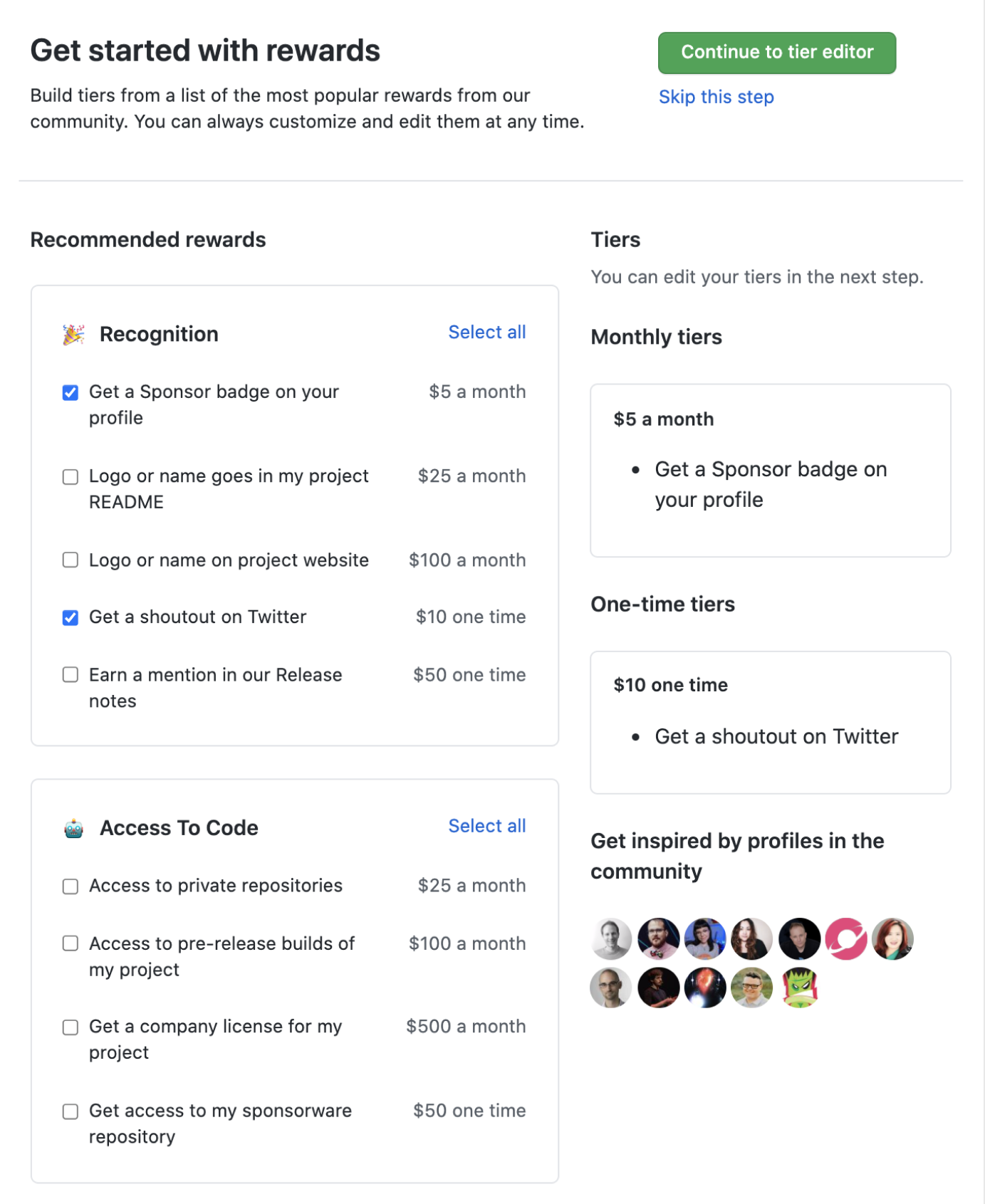Today, we're adding support for users to create a GitHub Sponsors profile and choose to receive sponsorship payouts via a fiscal host. This will give maintainers more flexibility and choice in how they receive funding. This has already been possible for organizations creating a GitHub Sponsors profile, and that remains unchanged. Users and organizations can still choose to use a Stripe Connect account instead of a fiscal host if they prefer. Learn more about signing up for a GitHub Sponsors profile using a fiscal host.
In order to streamline sponsoring maintainers, we're changing the custom amount settings for GitHub Sponsors. Starting October 3rd, 2022, all Sponsors profiles will have custom amounts enabled by default.
- On that date, if you haven't enabled custom amounts previously, we will set your minimum custom amount to either your lowest published monthly tier or your lowest published one-time tier, whichever is higher. If you wish to change the minimum, you can enable custom amounts on your Sponsors dashboard (if not already enabled), and then set it to your preferred minimum.
- If you set a minimum custom amount before October 3, 2022, it will remain unchanged.

GitHub Sponsors is now available in 30 new regions! Waitlists are gone and you can now sign up for Sponsors if you have a bank account in Argentina, Bolivia, Chile, Colombia, Costa Rica, Croatia, Dominican Republic, Egypt, The Gambia, Gibraltar, Hungary, Iceland, Indonesia, Israel, Kenya, Liechtenstein, Morocco, Paraguay, Peru, The Philippines, Saudi Arabia, Serbia, South Africa, South Korea, Thailand, Trinidad and Tobago, Tunisia, Turkey, The United Arab Emirates, and Uruguay.
As always, you can sponsor projects from wherever GitHub does business and join the Sponsors waitlist if we're not yet in your region.
The GitHub Sponsors Explore page, which lists your sponsorable dependencies, has been updated with improved functionality. See how many of your or your organization's dependencies come from a single maintainer, how close the maintainers are to their funding goals, group by multiple ecosystems, find maintainers who accept one-time payments and more.
You can now sign up to be sponsored via GitHub Sponsors if you have a bank account and tax residence in Brazil. Read about the rollout on our blog and stay tuned for more news on expansion.
As always, you can sponsor projects from wherever GitHub does business and join the Sponsors waitlist if we’re not yet in your region.
You can now sign up for Sponsors if you have a bank account and tax residence in India. Read about the rollout on our blog and stay tuned for more news on expansion.
As always, you can sponsor projects from wherever GitHub does business and join the Sponsors waitlist if we're not yet in your region.
You can now offer private repository access linked to a sponsor tier. GitHub will keep the list of collaborators in sync with your sponsors. You could use this for early access, a private Discussion or for sponsors-only access to your projects. Learn more about setting it up in the documentation.
You can now add custom parameters to your sponsorship URL in order to see what links your sponsors are coming to you from. Learn more about formatting your custom URLs and how to export the metadata in the documentation.
On Saturday November 13, 2021 from 7:00PM to 9:00PM PST, GitHub’s billing systems will undergo scheduled maintenance.
During this time period, certain payment functionalities will be unavailable including:
- Adding a new payment method or updating existing payment methods
- Signing up for a new paid GitHub account
- Upgrading existing account to a new paid GitHub plan
- Paying invoices
- Making new Marketplace purchases
- Adding new sponsorships or changing tiers of existing sponsorships
Thank you for your patience as we work to improve our systems.
Organizations can now join GitHub Sponsors using a personal bank account, in addition to using a business bank account or a fiscal host.
Learn more about setting up GitHub Sponsors for your organization.





